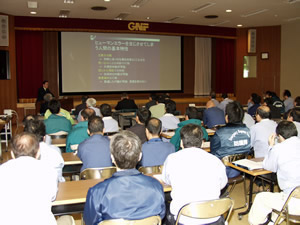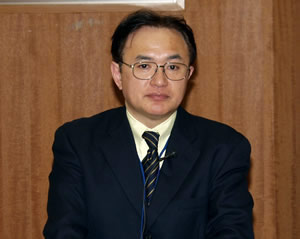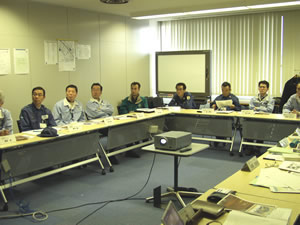|
|
 |
|
|
The 91st Safety Caravan was conducted at Global Nuclear Fuel - Japan Co., Ltd. in Yokosuka City, Kanagawa Prefecture on February 2, 2007. |
| Safety Presentation |

|
|
During the Safety Presentation
|
Approximately 80 employees of Global Nuclear Fuel - Japan Co., Ltd. attended the Safety Presentation.
The presentation began with a salutation from Mr. Mikio Sakurai, President of Global Nuclear Fuel - Japan Co., Ltd. "In the operation of nuclear fuel fabrication business, how to create a safe working environment and turn out safe products are very serious matters. Today we look forward to learning how to do this and to receiving information that will serve us as reference. Based on the spirit of ISQO, we strongly hope to create a society ingrained with safety culture, where human error does not occur."
After the salutation, JANTI's Executive Director, Mr. Noda, introduced an overview of the organization's activities, followed by Professor Takashi Matsuo from the University of Kitakyushu , Faculty of Humanities, Department of Human Relations, who delivered a presentation entitled "Human Error and Safety Culture." |
Lecture highlights |

|
Professor Takashi Matsuo, University of Kitakyushu,
Faculty of Humanities, Department of Human Relations
|
At the presentation, Professor Matsuo brought up some very valuable points, including the following.
. Why do human errors occur?
We humans are creatures that live our lives by adapting to the real world. When we consider the history of evolution, since we did not live in an environment that demanded minute accuracy, effectiveness took priority over accuracy, and so we are poor at conducting ourselves and making decisions based on accurate logic. Because of that, making errors (human errors) has become a part of our natural behavior. Human error has come to be a problem because 1) humans have come to operate large-scale mechanisms and implements of energy production, 2) thus the division of duties has become necessary, and the conveyance of information has become difficult.
. Preventive measures against human errors
In the prevention of human errors, we need to take the error resistance approach that reduces the occurrence of errors themselves, and the error tolerance approach whereby even if errors occur they will not lead to trouble. In order to reduce the occurrence of errors, we need to decrease the actual opportunities for humans to be involved in operations, make the operations easy to understand, and share information. On the other front, in order to prevent errors from leading to trouble, it is important to create a mechanism for providing an external clue that an error has occurred. As such external clues, we can consider the four elements of designing hardware that does not allow for mistakes to be made (foolproof systems), indicators that are easy to understand, devices such as making manuals and procedural documents easy to understand, and having other people take notice.
. Endeavors by individuals
As individuals, it is important that we make endeavors to improve our working skills, raise awareness of risks, and raise the level of our expertise, and as an organization, share the understanding in what needs to be done in order to foster safety culture.
. Toward establishing safety culture
In establishing safety culture, endeavors as an organization are needed. Individual behavior depends on the advantages and disadvantages to the individual, and so unless safe conduct is seen as providing some personal merit to the individual, even if some matter has been called to the individual's attention, this will not lead to enduring safe conduct. We need to formulate societal criteria of safe conduct as an organization. However, when there are exceptions to the regulations, and if strict observance were to require effort, non-observance would become established as the standard. In setting up a safe system, the lessons of troubles and close call incidents must be learned. It is not a matter of trying to solve problems through retribution or dismissal of the parties concerned in the trouble, conversely it requires that the root causes of the trouble be clarified, and with the aim of preventing troubles, make use of such troubles in studies down the road. Rather, the parties involved in the trouble should be exempted from responsibility, the causes of the trouble should be investigated, and this must lead to the public benefit by preventing possible future occurrences that might have drastic consequences.
|
In the questionnaire after the presentation, the following opinions were expressed.
• I learned that it is only natural for people to make human errors and that it is not right to condemn a person for these mistakes, and in the construction of a system, when protocol is being determined, the inevitability of human error should be premised.
• The lecture provided the listener with motivation, in that the foundation of humanity is geniality toward other humans. By routinely focusing on responses and measures and not being able to see the forest for the trees, we tend to lack perspective that would come from taking a step backward and looking at the big picture. I think the lecture was helpful in thinking of measures for seeing the big picture.
• The statement that "causing human error is the basic nature of the human being" had a profound impact on me and will not be soon forgotten. The person who committed the error is not the only one at fault, and I felt that it is important for everyone in the area to increase attempts to nip the causes of errors in the bud.
|
Safety information exchange session |

|
|
During the Safety information exchange session
|
| By request of Global Nuclear Fuel - Japan Co., Ltd., t he safety information exchange session was honored by the presence of Mr. Makoto Sawamoto, operator, and Mr. Akira Nakagawa, Shift Manager of the Second Operation Section of Kansai Electric Power Company's Takahama Nuclear Power Station, who spoke in detail about the commendable practice of "Endeavors Concerning the Prevention of Human Errors through the Passing Down of Operating Skills to Subsequent Generations" noted during the peer review of Kansai Electric Power Company's Takahama Nuclear Power Station.
Following the talks, opinions were exchanged regarding the above mentioned endeavors. |
|
|







